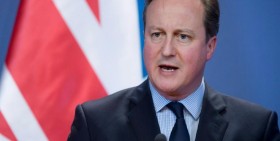David Cameron says no guarantee that
people who enter UK on
spousal visa can stay if they fail to improve language.Migrants who fail
language tests after two and a half years in the UK
He outlined
the plan in an interview with the BBC Radio 4 Today programme, claiming there
were 38,000 Muslim women who could not speak English and 190,000 with limited
skills in the language.
Cameron
said not just Muslim women, but all those who entered the UK
“After two
and half years they should be improving their English and we will be testing
them,” the prime minister said. “We will bring this in October and it will
apply to people who have come in on a spousal visa recently and they will be
tested.”
Cameron
stressed that he was not blaming those who could not speak English because
“some of these people have come from quite patriarchal societies and perhaps
the menfolk haven’t wanted them to speak English”.
But when
questioned about whether they would be asked to leave the country if they
failed to start learning the language, he said that was possible as “people
coming to our country have responsibilities too”.
“They can’t
guarantee they will be able to stay, because under our rules you have to be able
to speak a basic level of English to come into the country as a husband or
wife. We made that change already, and we are now going to toughen that up, so
halfway through the five-year spousal settlement there will be another
opportunity to make sure your English is improving. You can’t guarantee you can
stay if you are not improving your language.”
Cameron
defended his plan to launch a £20m language fund to help Muslim women unable
to speak English. He had overseen cuts to funding for language lessons for
immigrants.
Earlier, he
called for an end to the “passive tolerance” of separate communities, which
left many Muslim women facing discrimination and social isolation.
The prime
minister said he would not avoid telling the “hard truths” required to confront
the minority of Muslim men whose “backward attitudes” led them to exert
“damaging control” over women in their families.
“All too
often, because of what I would call ‘passive tolerance’, people subscribe to
the flawed idea of separate development,” he wrote in the Times. “It is time to
change our approach. We will never truly build One Nation unless we are more
assertive about our liberal values, more clear about the expectations we place
on those who come to live here and build our country together, and are more
creative and generous in the work we do to break down barriers.”
The new
English language scheme would try to reach the most isolated women, targeting
specific communities based on the ongoing review into segregation being carried
out by Louise Casey, the head of the government’s troubled families unit.
Classes
would be held in homes, schools and community centres, with travel and
childcare costs provided to encourage participation.
Cameron
said all public services, including nurseries, schools, health visiting and job
centres, needed to play a part in tackling “prejudice and bigotry” and building
integration.
The
announcement of £20m for English classes was welcomed by Shaista Gohir, chair
of the Muslim Women’s Network, but she said “it should be directed at all
communities, not just Muslims – and it shouldn’t be linked to radicalisation.
People learning English is a good thing, so they know their rights and can
participate in society. Cameron says he wants to empower Muslim women. But what
about Muslim women who already speak English and still face barriers to
participation?”
Muslim
women, she said, were often marginalised by men in their own communities, in
mosques and local politics. “Women with skills and abilities are often
overlooked; very few women have broken barriers. That’s the real problem that’s
not being tackled. We need to break up the Muslim old boys network that keeps
us sidelined.”

No comments:
Post a Comment